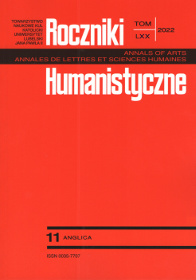The Child and the Anthropocene: A Time Travel Narrative as a Means to Empower Children in the Face of a Global Pandemic
Abstract
The following article looks at a contemporary children’s time travel story, The Dog Who Saved the World by Ross Welford, written and published just at the very outset of the COVID-19 epidemic. The novel is itself about an even more potentially dangerous epidemic which might have serious consequences in the near future for the whole of humanity. The author skilfully uses the narrative in order to include the child reader by replicating the mood and atmosphere of the current pandemic, thus, effectively empowering them against it. To achieve this, the author foregrounds what he considers to be “good” as opposed to “bad” technology and enables the child to comfortably deal with its complexities along with the complexity of time travel through scientific initialisms and other forms of abbreviation which children are highly familiar with (texting friends on smartphones or using the social media).
References
Boseley, Sarah. “Origin Story: What Do We Know about Where Coronavirus Came from?” The Guardian, 12 Dec. 2020, www.theguardian.com/world/2020/dec/12/where-did-coronavirus-come-from-covid. Accessed 7 June 2022.
Campbell, Joseph. The Order and the Other: Young Adult Dystopian Literature and Science Fiction. UP of Mississipi, 2019.
Crossley-Holland, Kevin. The Penguin Book of Norse Myths: Gods of the Vikings. Penguin, 2011.
Jaques, Zoe. Children’s Literature and the Postmodern: Animal, Environment, Cyborg. Routledge, 2018.
Tagliamonte, Sali. “So Sick or So Cool: The Language of Youth on the Internet.” Language in Society, vol. 45, 2016, pp. 1–39.
Thompson, Stephen. “The Child, the Family, the Relationship. Familiar Stories: Family Storytelling, and Ideology in Philip Pullman’s His Dark Materials.” In Children’s Literature: New Approaches, edited by Karin Lesnik-Oberstein, Palgrave Macmillian, 2004, pp. 144–67.
Thompson, Terry. “I Determined to Descend: Devolution in the Time Machine.” The CEA Critic, vol. 63, no. 3, 2001, pp. 13–22.
Sainsbury, Lisa. Metaphysics of Children’s Literature: Climbing Fuzzy Mountains. Bloomsbury Academic, 2021.
UK Health Security Agency. “Covid 19: epidemiology, Virology and Clinical Features.” 16 Jan. 2020 (updated 17 May 2022), www.gov.uk/government/publications/wuhan-novel-coronavirus-background-information. Accessed 20 June 2022.
Welford, Ross. The Dog Who Saved the World. HarperCollins, 2019.
Wells, Herbert. The Time Machine. Everyman, 2002.
Zimmerman, Lee. Trauma and the Discourse of Climate Change: Literature, Psychoanalysis, and Denial. Routledge, 2020.
Copyright (c) 2022 Roczniki Humanistyczne

This work is licensed under a Creative Commons Attribution-NonCommercial-NoDerivatives 4.0 International License.





